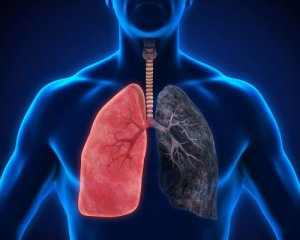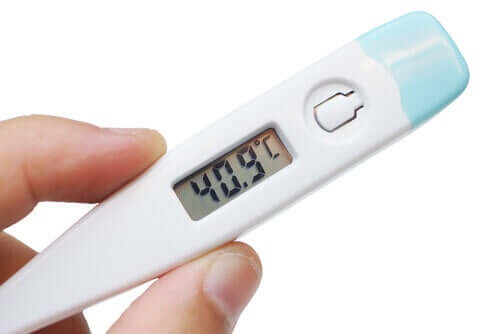8 Symptoms of Pneumonia that You Shouldn't Ignore


Written and verified by the pedagogue in physical education and nutritionist Elisa Morales Lupayante
Pneumonia is an infection that directly affects the lungs. This can lead to a number of serious health issues, so it’s important to diagnose and treat it as soon as possible. Do you know which pneumonia symptoms you shouldn’t ignore?
This condition more often affects those who have a weakened immune system. However, it can affect other people, too. For that reason. it’s important to recognize the signs; the earlier the better.
What exactly is pneumonia?
The lungs carry out one of the most important processes of the human body: respiration. They distribute oxygen and expel carbon dioxide from our bodies.
Pneumonia is an infection that can affect one or both of the lungs. It causes the lungs to fill up with liquid and pus, making it considerably harder for the person to breathe. Because of the decrease in oxygen and the accumulation of carbon dioxide in the body, it can be life-threatening.
What are the causes of pneumonia?
There are several germs that can cause pneumonia. However, viruses and bacteria are the most common causes. Other cases of pneumonia are as follows:
- Inhaling microbes.
- Flu complications.
- A pneumococcal or fungal infection.
- Inhaling certain foods, liquids or secretions, among other things.
- Bacteria and viruses originating in the nose, mouth or paranasal sinuses can move towards the lungs.
What are the symptoms of pneumonia?
1. Chills
Normally, people suffering from pneumonia experience repeated chills throughout the day. These chills can last anywhere between thirty and sixty minutes.
2. Fever and cough
These are the most common symptoms seen in those suffering from pneumonia. They can show consistent fevers that reach up to 40º C (104ºF), general sickness and cough.
Mucus and phlegm may also be present in coughs. They may be brownish-red or yellow-green in color. In some cases, blood might be present. Likewise, the fever and cough might be preceded by a throat infection.

3. Breathing difficulties
Breathing difficulties occur due to the little oxygen that the body receives when it suffers from a disease like pneumonia. It’s more apparent when undertaking activities that require physical exertion, such as climbing stairs, walking quickly or lifting heavy objects. In addition to making it harder to breathe, this condition can also lead to quick, shallow breaths.
When feeling unwell and facing breathing difficulty, many patients may have little energy or feel fatigued.
4. Confusion
In cases where the patient is elderly, one of the symptoms of pneumonia may be confusion and disorientation. Research has also suggested that certain infections increase the risk of brain injuries and Alzheimer’s.
5. Pain when inhaling
People suffering from pneumonia usually experience pain when breathing in. The pain results from an inflamed pleura, better known as pleuritis.
6. Numbness and color changes in limbs
As a result of the lack of oxygen in the blood, other symptoms of pneumonia include coldness, inflammation, and numbness of the lips, tongue, extremities, fingers and nose. These areas may even appear blue or purplish in color.
7. White nail syndrome
Also known as leukonychia, this syndrome can result from chemical poisoning, cardiac diseases, pneumonia, or hypoalbuminemia.
In addition to those mentioned previously, other symptoms of pneumonia include excessive sweating and clammy skin, little energy, and fatigue.
8. Joint pain
Some people suffering from this disease can experience constant joint pain due to the little amount of oxygen flowing through the body.

Pneumonia: prognosis
When it comes to pneumonia, the prognosis can vary depending on a number of different factors; age, the underlying illness, the reaction of the immune system, and the type of treatment will all determine how the condition progresses.
However, in the majority of cases, those suffering from pneumonia should start to recover within two weeks, if they respond well to treatment. Pneumonia can be more serious when it involves older patients, or those suffering from cardiac or pulmonary problems.
If you think you have any of these symptoms, visit your doctor
If you show several of these symptoms, you should talk to your trusted physician, who can carry out the necessary tests. In doing so, they’ll be able to determine whether or not you’re suffering from pneumonia, and start the most appropriate course of treatment for your particular case.
All cited sources were thoroughly reviewed by our team to ensure their quality, reliability, currency, and validity. The bibliography of this article was considered reliable and of academic or scientific accuracy.
- Faraaz Ali Shah, et al.Bidirectional Relationship between Cognitive Function and Pneumonia. Am J Respir Crit Care Med. 2013 Sep 1; 188(5): 586–592.
- Prina E, et al. New aspects in the management of pneumonia. Critical Care 2016 20:267.
- Stupka J, et al. Community-acquired pneumonia in elderly patient.Aging health.2009; 5(6): 763–774.
- Tate J, et al. Infection hospitalization increases risk of dementia in the elderly.Crit Care Med. 2014 May;42(5):1037-46.
This text is provided for informational purposes only and does not replace consultation with a professional. If in doubt, consult your specialist.








